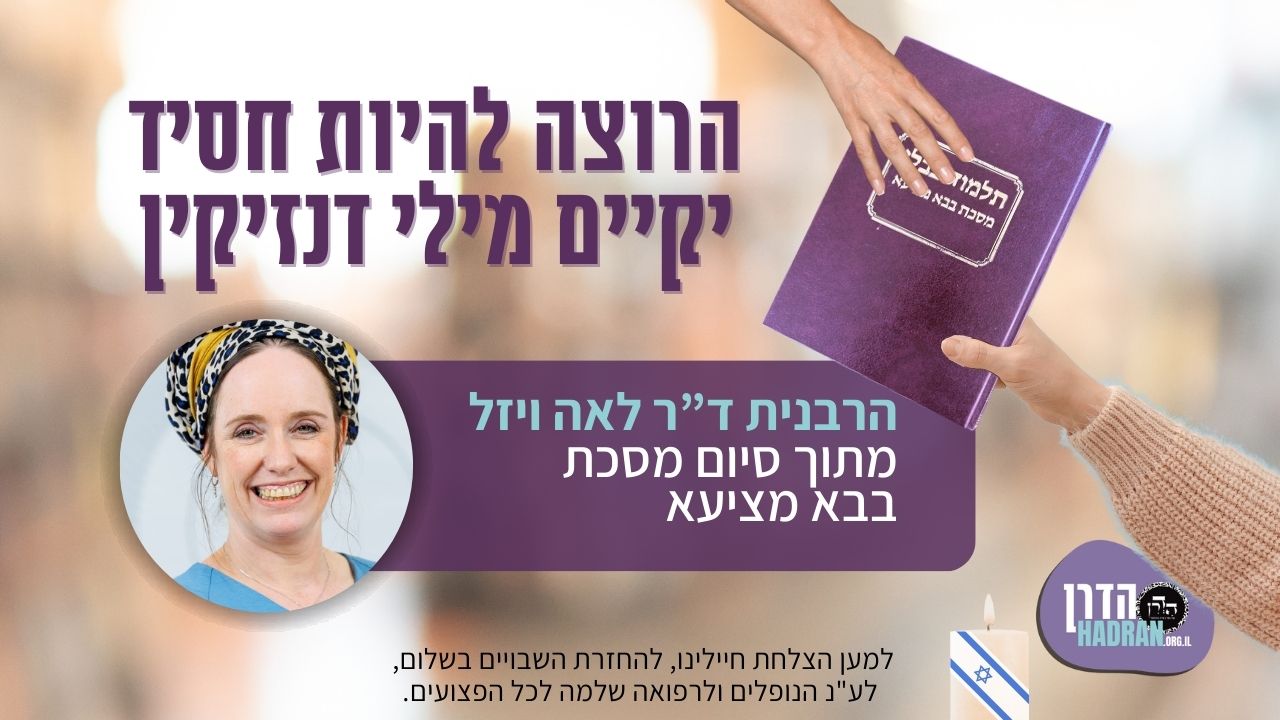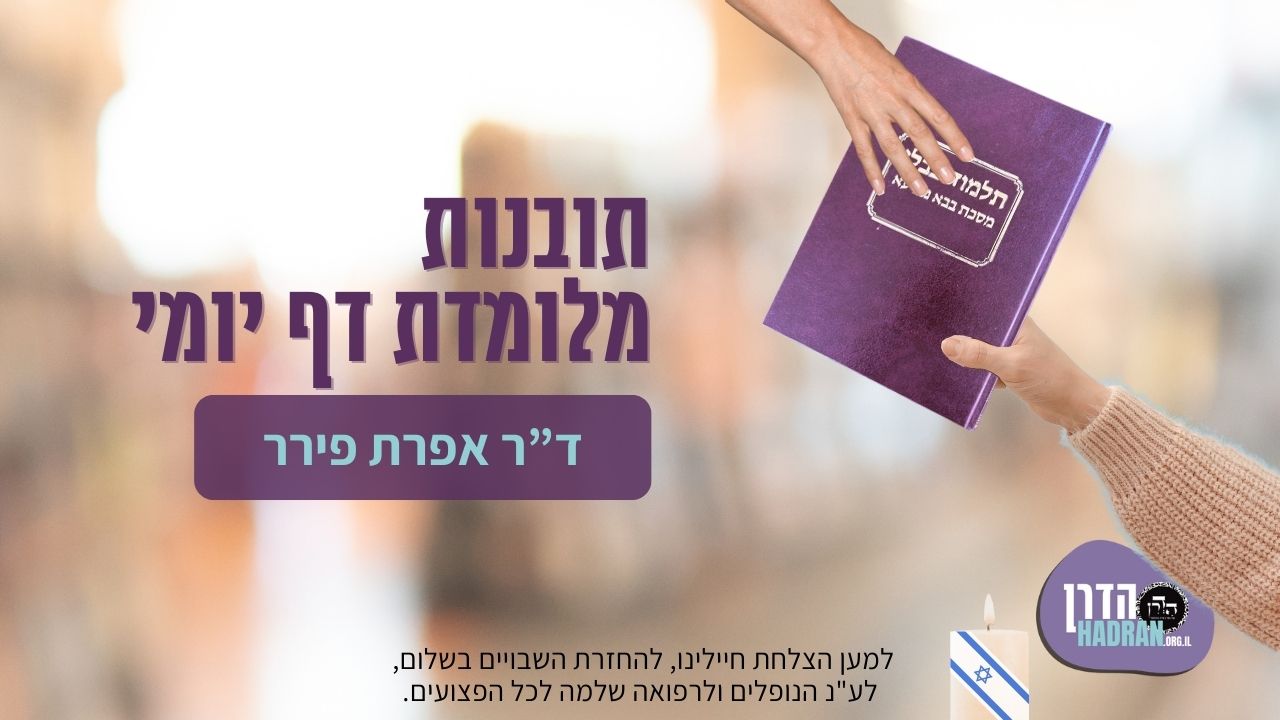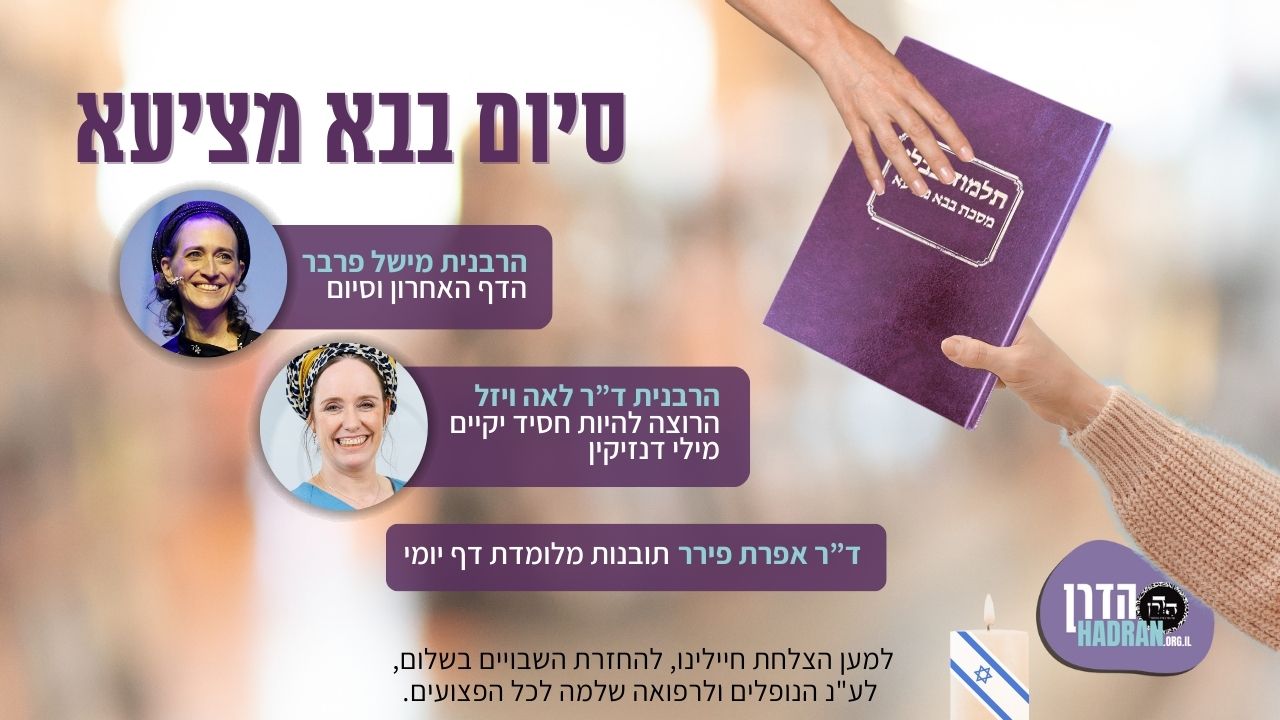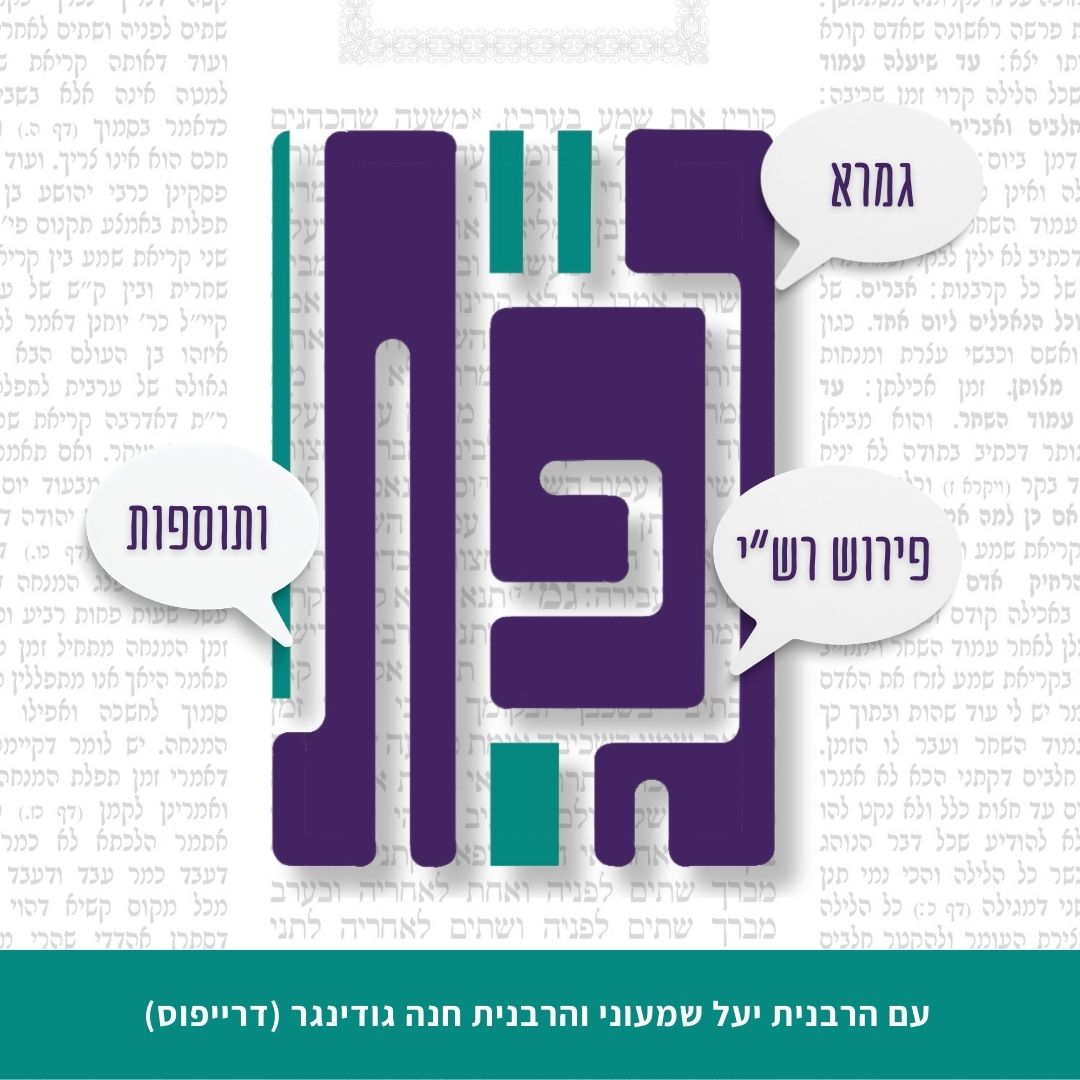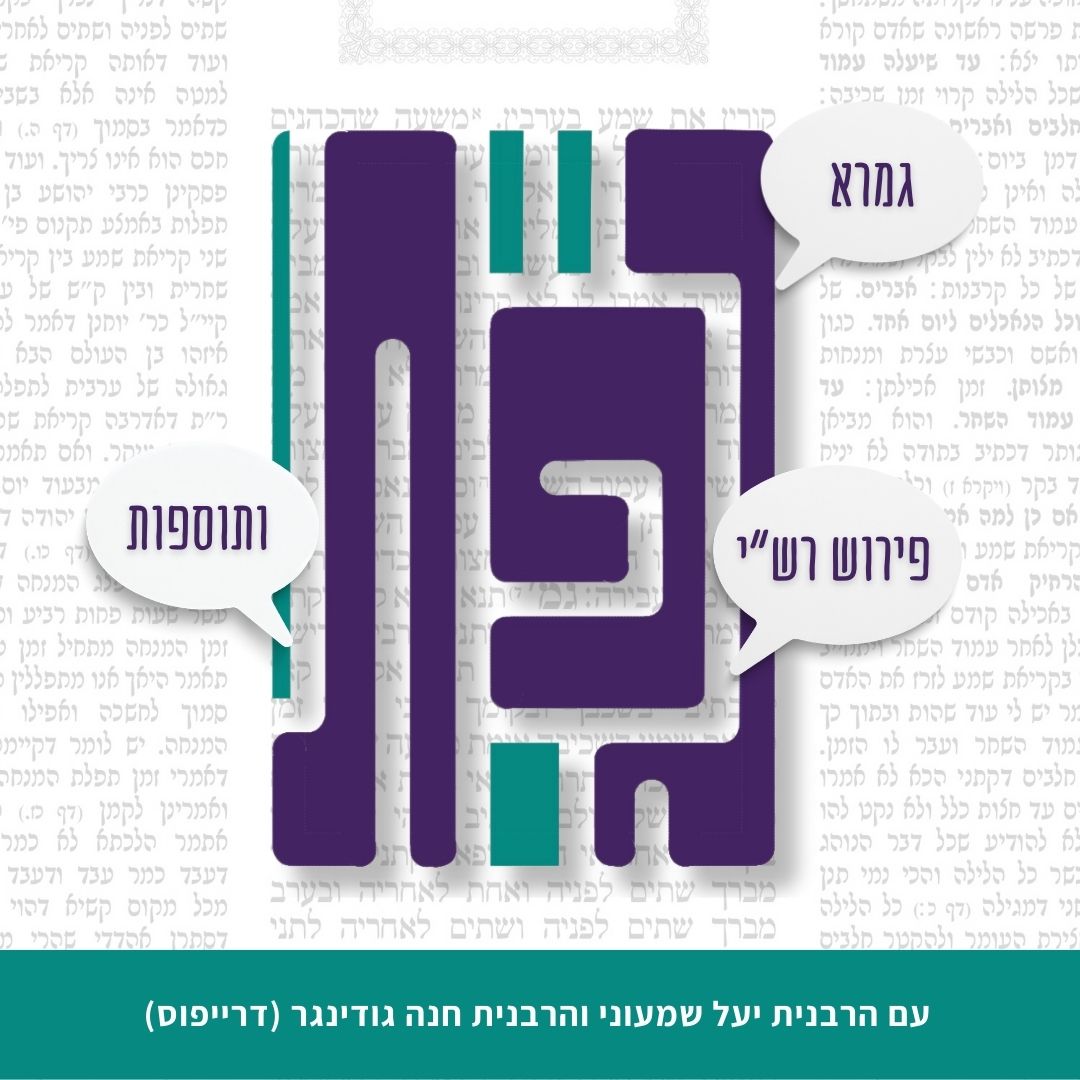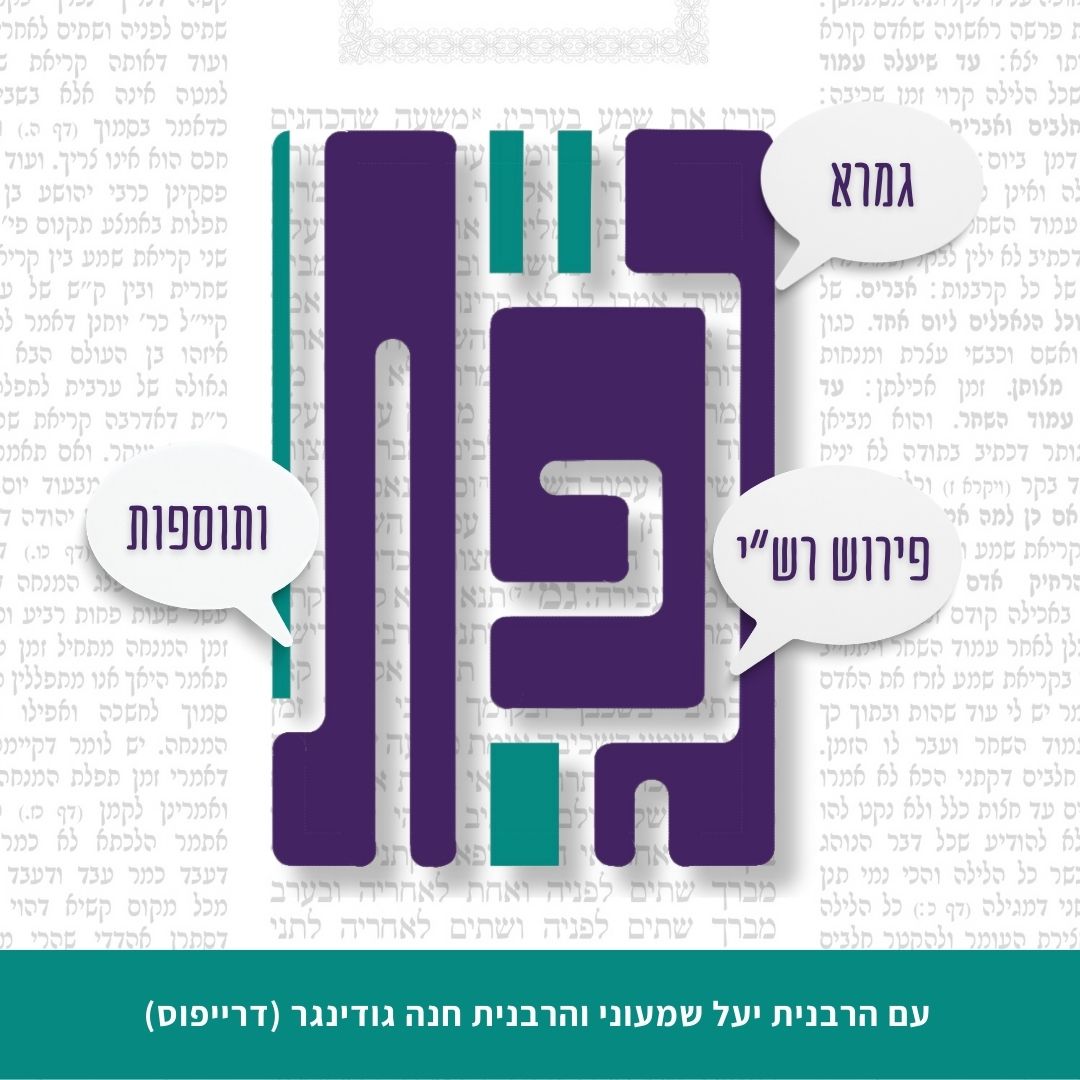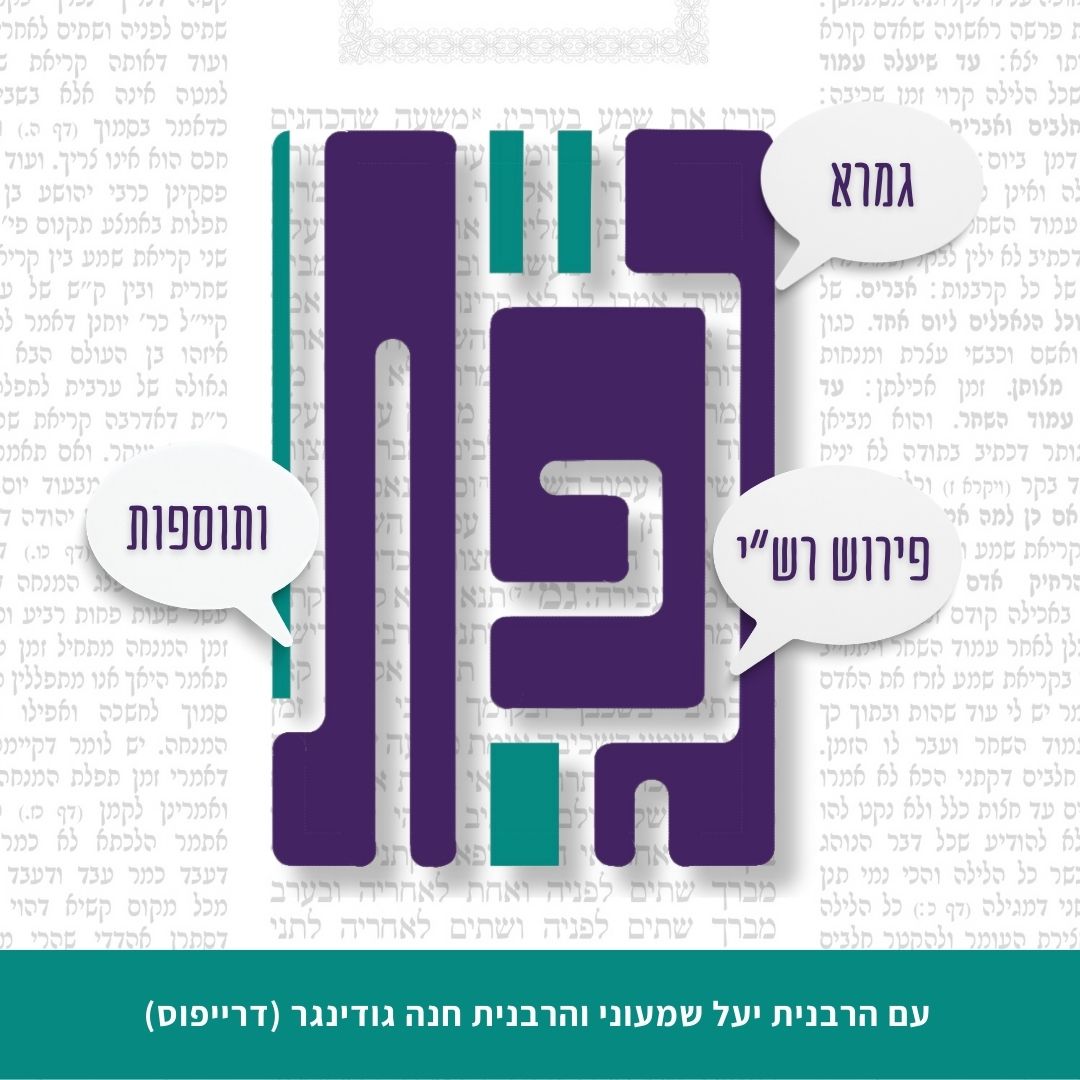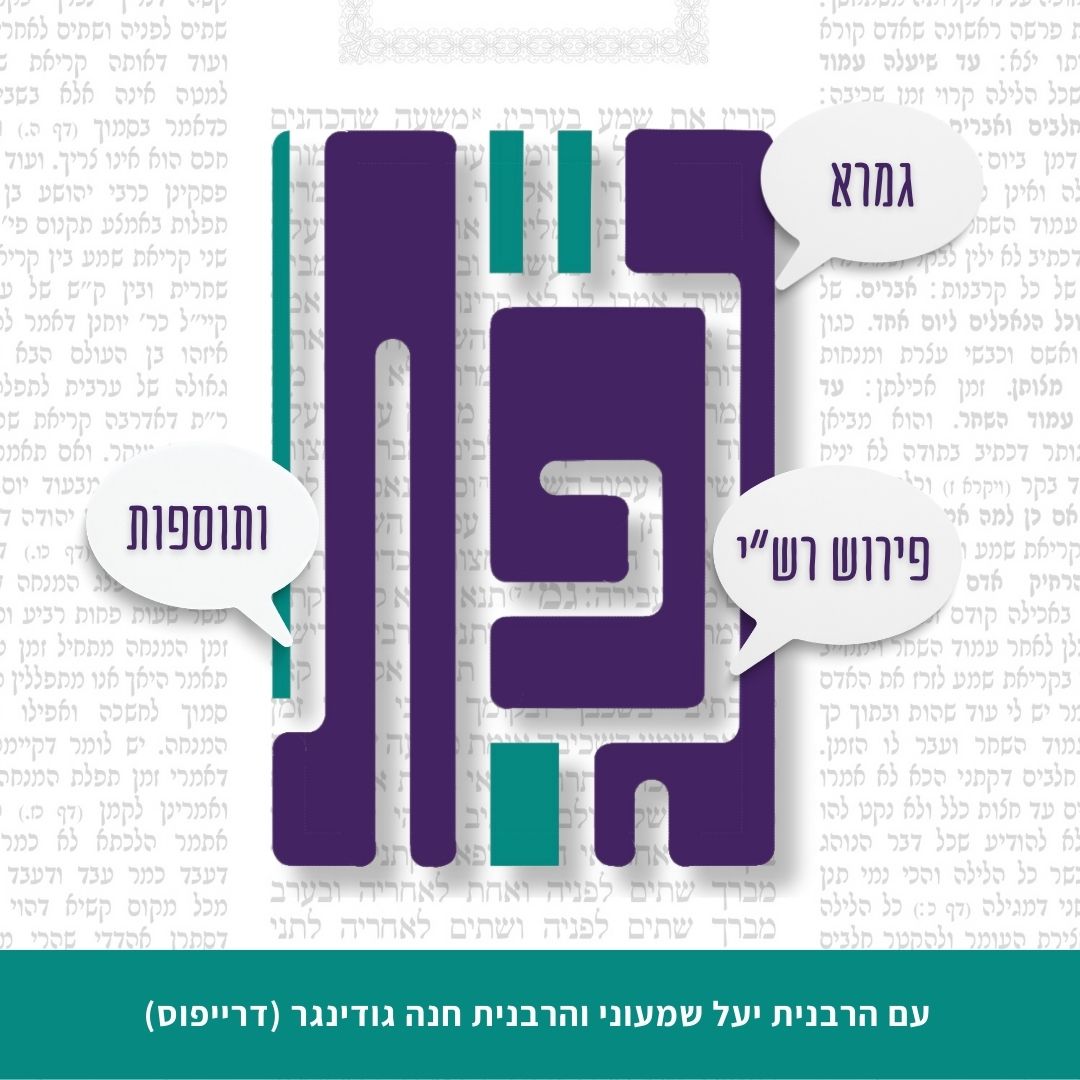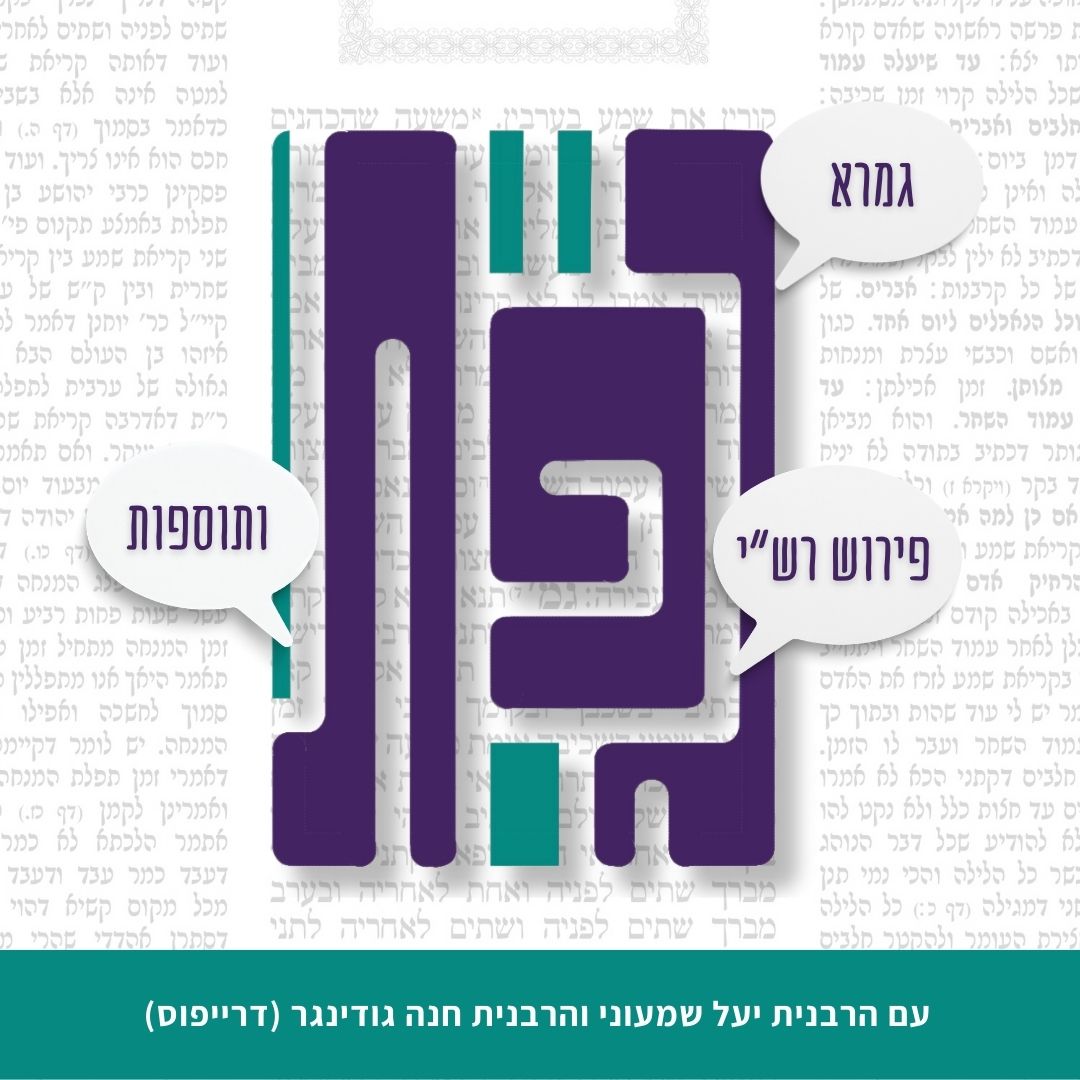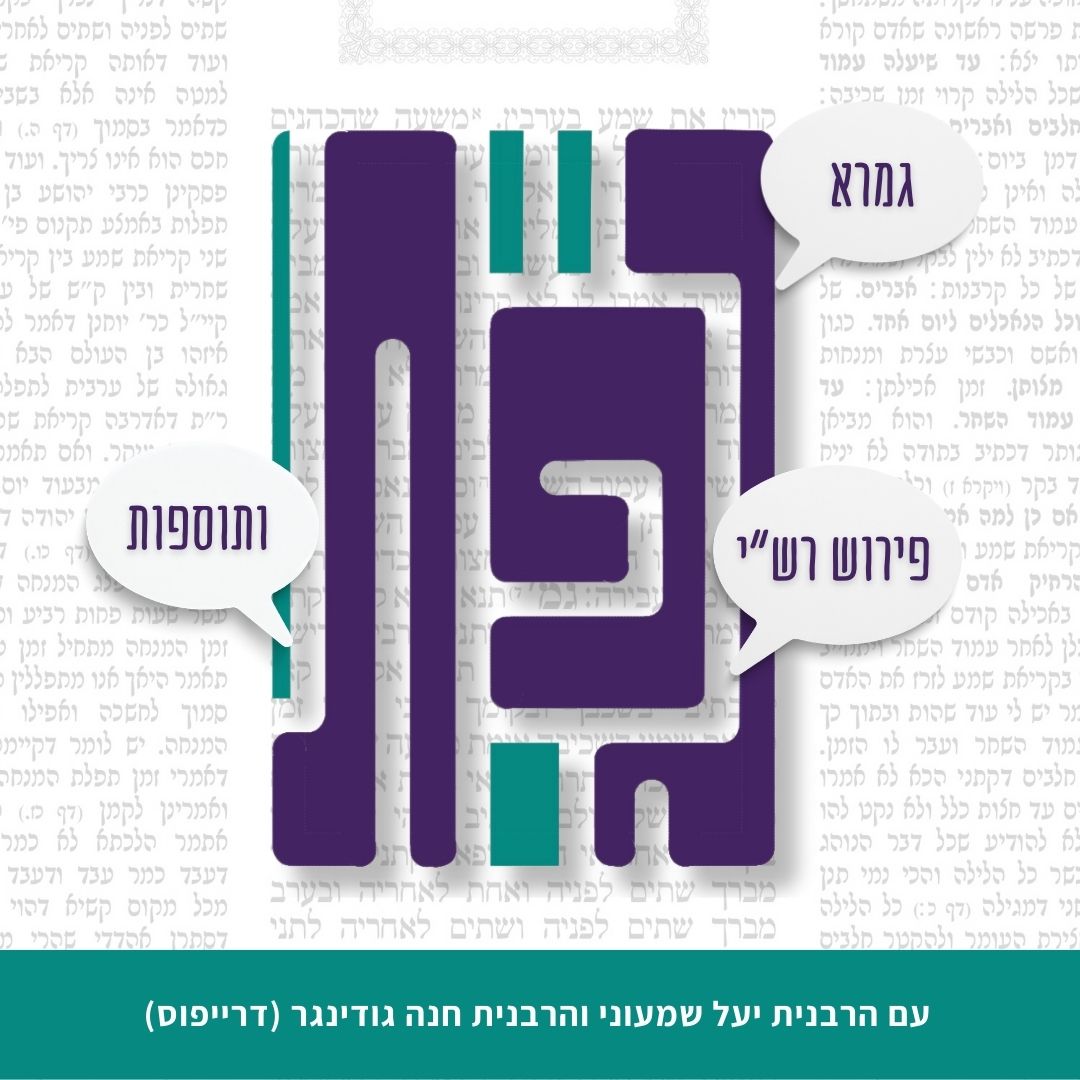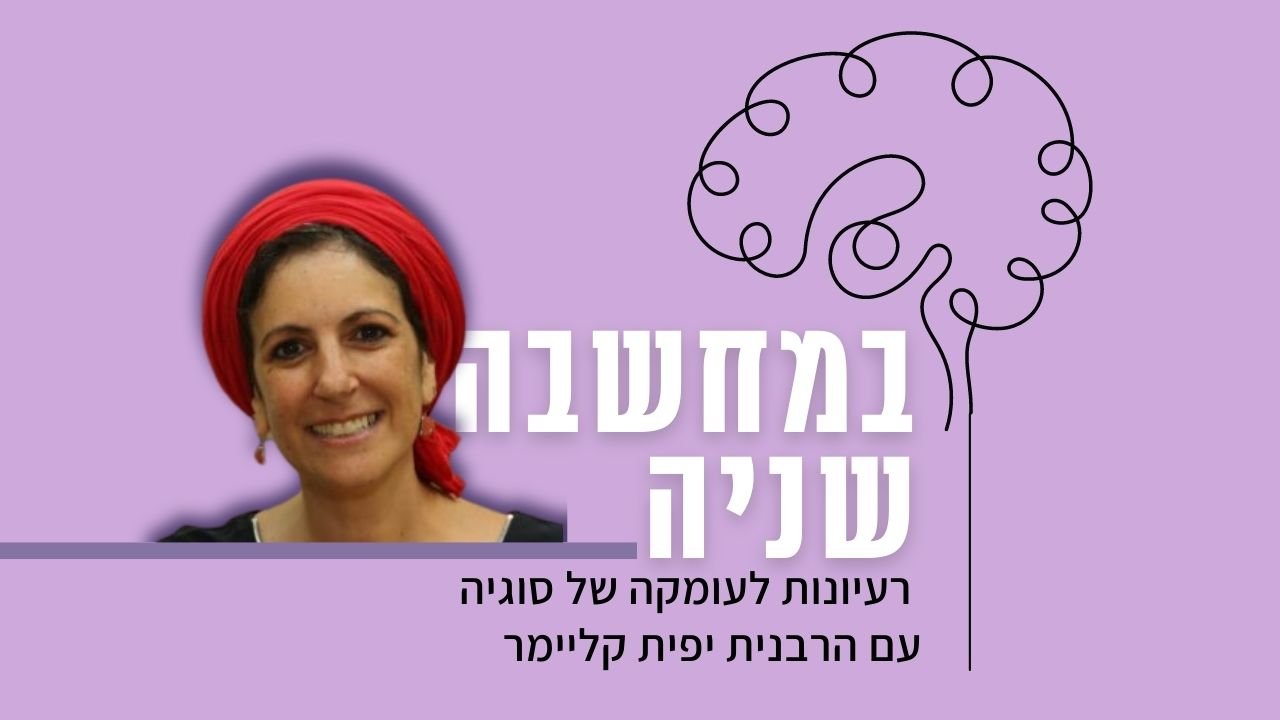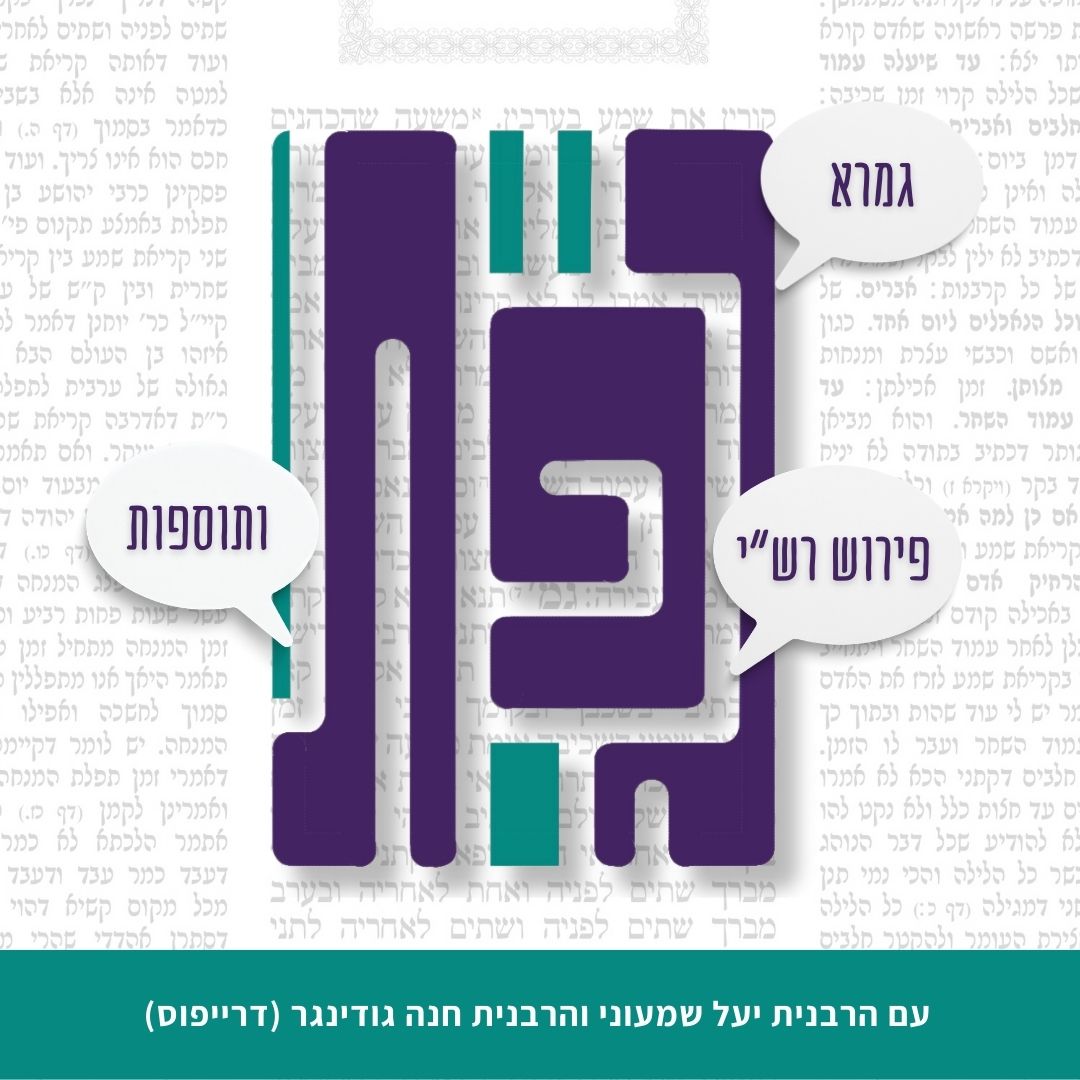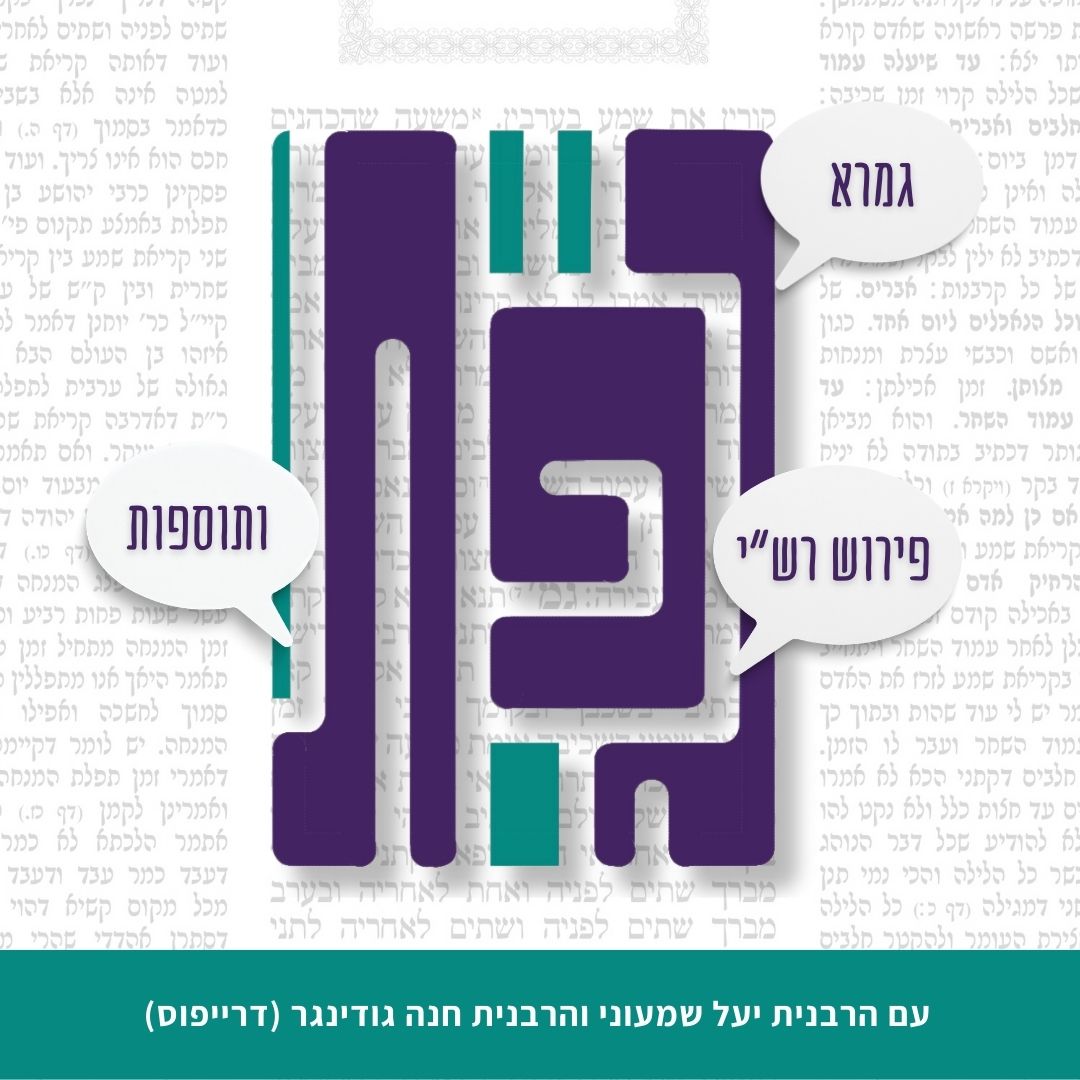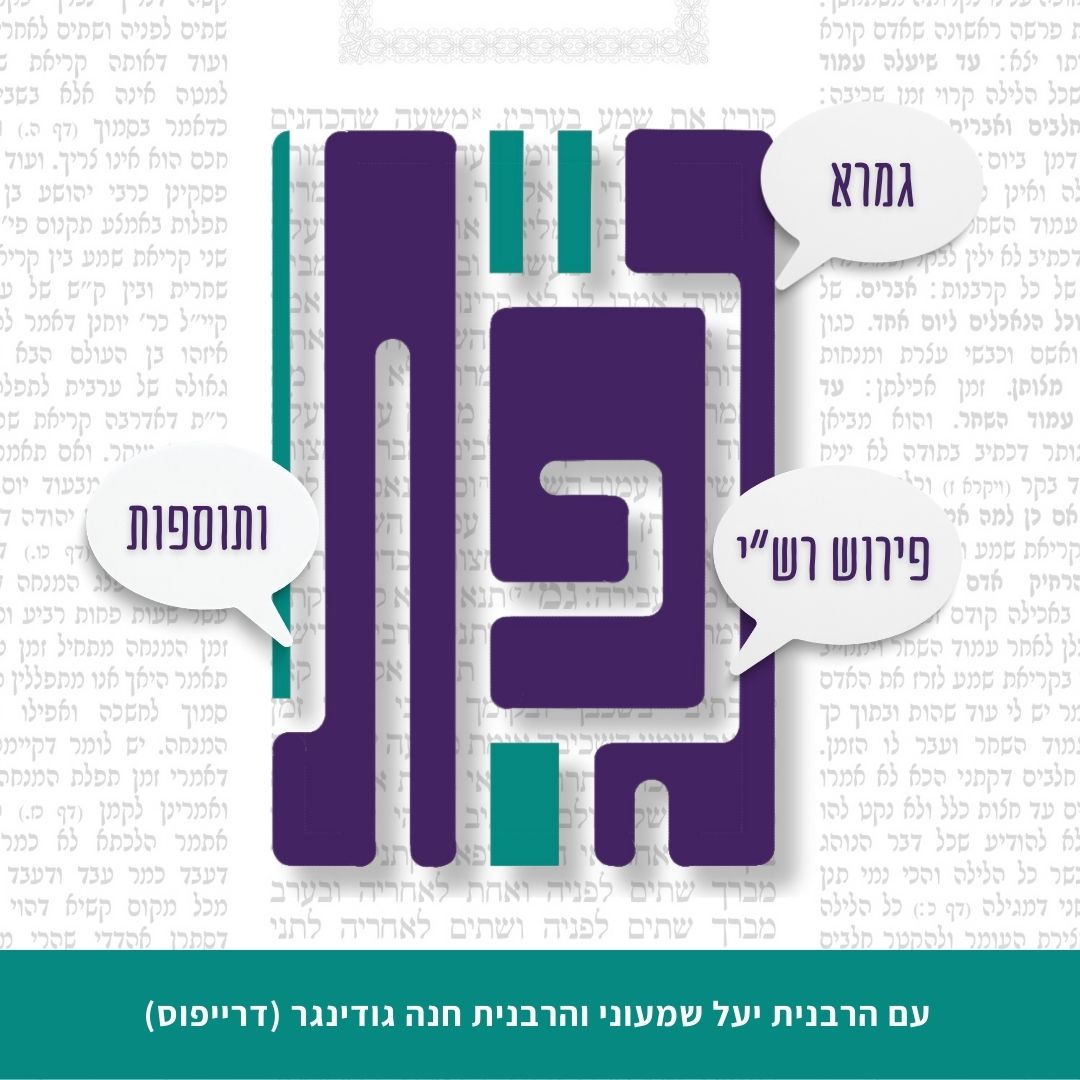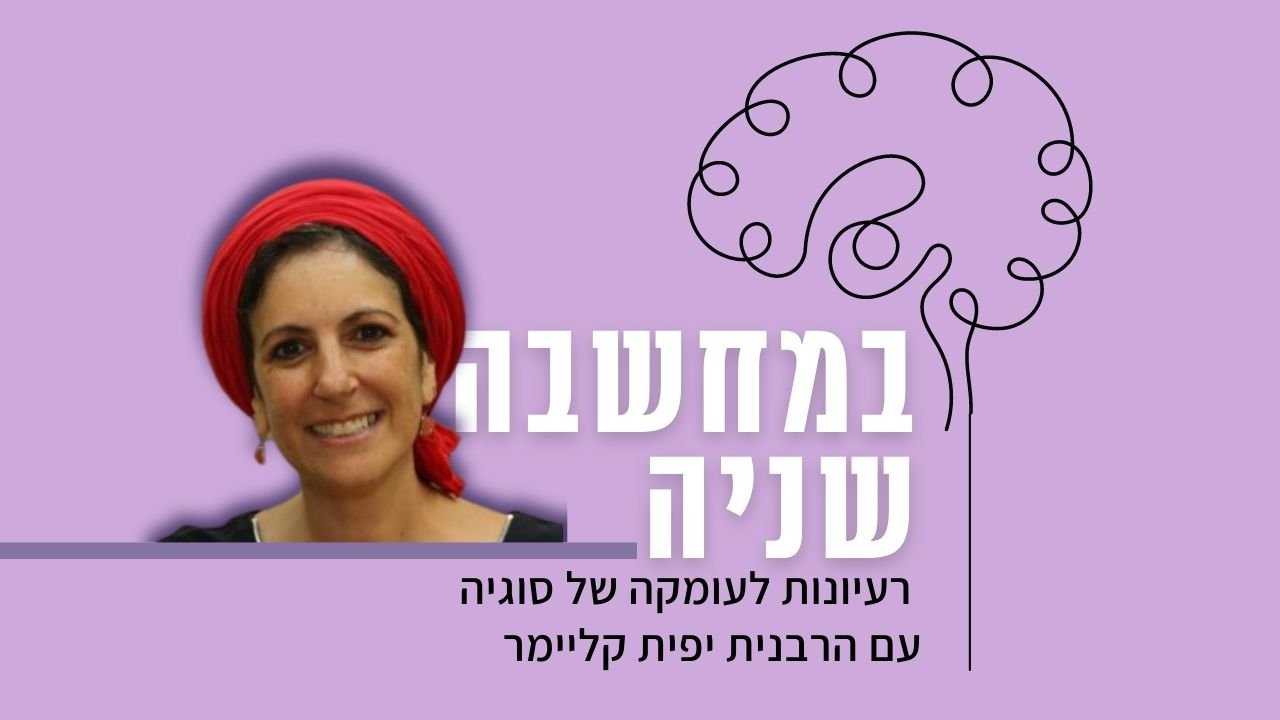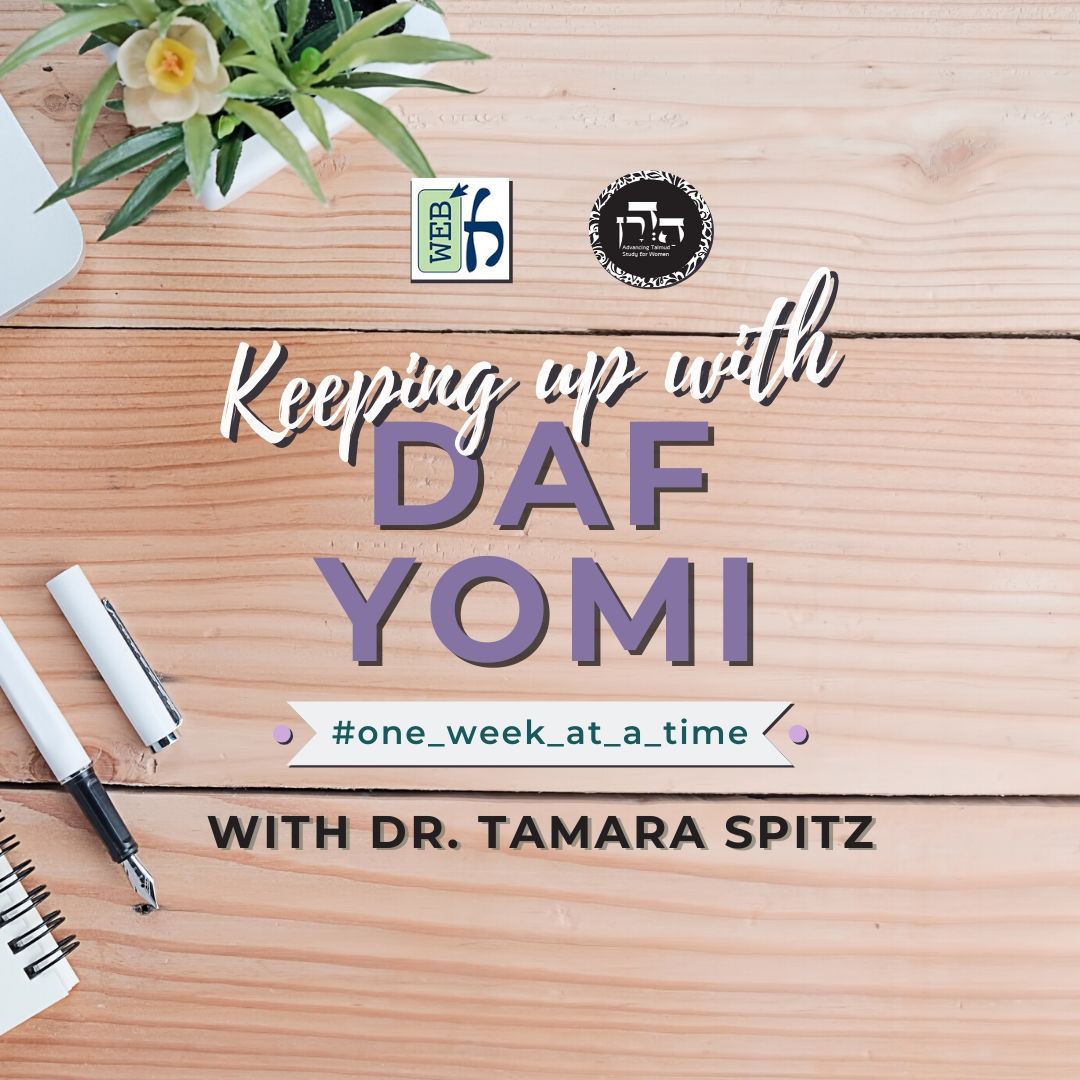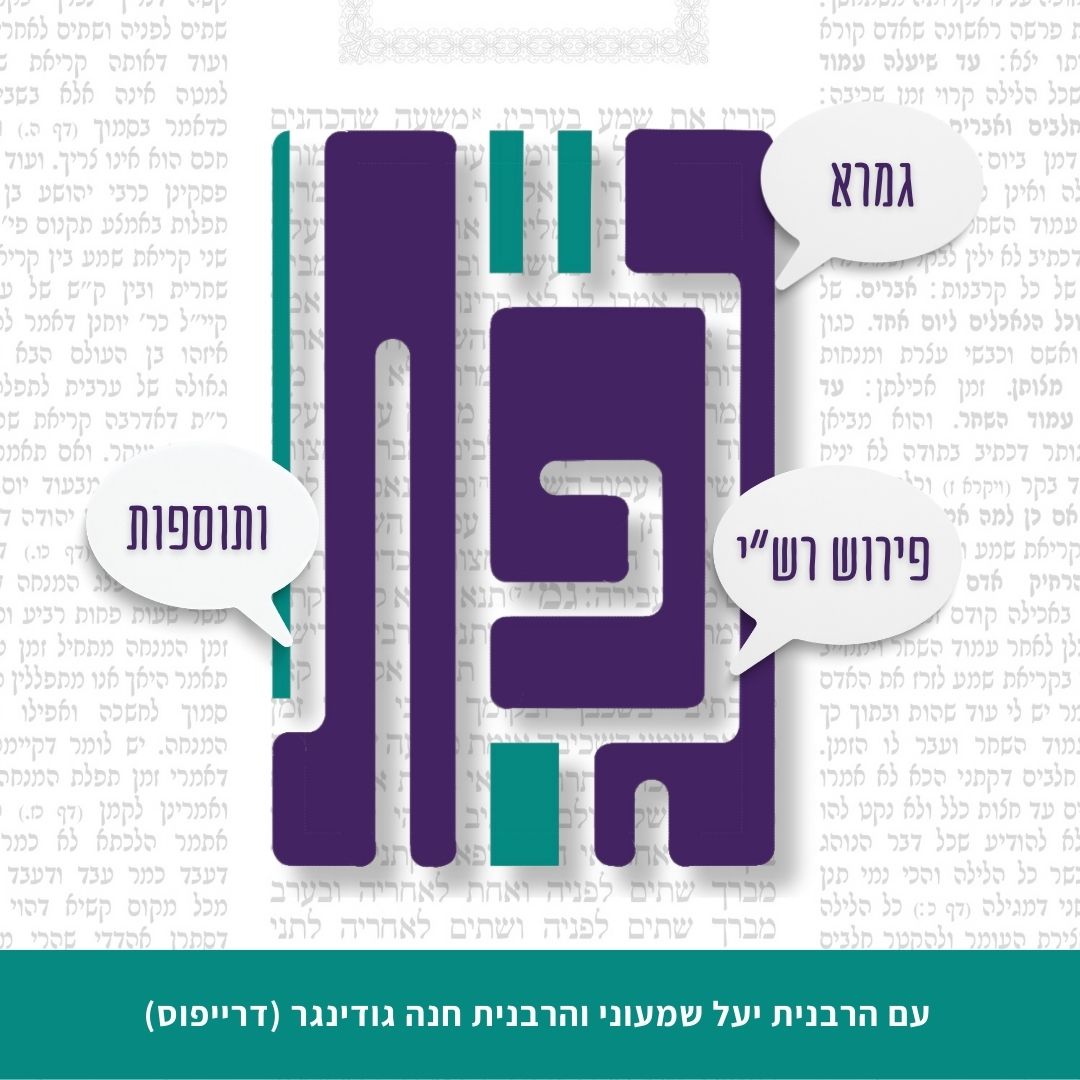לבית שמאי ובית הלל יש מחלוקת בנוגע בהחלפת מטבעות מעשר שני של כסף במטבעות זהב. בהתחלה הגמרא סוברת שהמחלוקת הזאת מתחברת לסוגיה שלנו בעניין מה מהשניים נחשב מטבע ומהו הסחורה. לרבי יוחנן וריש לקיש יש הבנות שונות במחלוקת. אך ישנן שלוש גרסאות לוויכוח בין רבי יוחנן לריש לקיש מה עומד בבסיס המחלוקת בין רבי יוחנן לריש לקיש. לפי שתי הגירסאות האחרות הנושא הוא אך ורק נוגע לדיני מעשר שני ואינו נוגעת לדיון על מטבע/סחורה. רב ולוי חולקים בהאם אפשר להשתמש בכסף לקניין חליפין, מעשה סמלי של רכישה. חליפין חייב להתבצע עם משהו שיש לו ערך מובנה. האם לכסף יש ערך מובנה בגלל שהוא עשוי ממתכת או שצפוי בו רק במונחים של התמונה על המטבע שבסופו של דבר יישחק?
הלימוד השבוע מוקדש לזכות ולשלום הַיְימׇנוֹט אֱמוּנָה בַּת באנצ’י (קָסָאוּ) בת 11 שנעלמה במקום מגוריה בצפת, לפני שנתיים, ביום ט”ז אדר תשפ”ד (25.2.24), ולא נודעו עקבותיה.
הלימוד השבוע מוקדש למען ביטחון המדינה, החיילים והאזרחים, ולמען חירותו של העם האיראני. שנזכה בקרוב שיתקיים בנו הפסוק: "לַיְּהוּדִים הָיְתָה אוֹרָה וְשִׂמְחָה וְשָׂשֹׂן וִיקָר”.
רוצה להקדיש שיעור?
כלים
הלימוד השבוע מוקדש לזכות ולשלום הַיְימׇנוֹט אֱמוּנָה בַּת באנצ’י (קָסָאוּ) בת 11 שנעלמה במקום מגוריה בצפת, לפני שנתיים, ביום ט”ז אדר תשפ”ד (25.2.24), ולא נודעו עקבותיה.
הלימוד השבוע מוקדש למען ביטחון המדינה, החיילים והאזרחים, ולמען חירותו של העם האיראני. שנזכה בקרוב שיתקיים בנו הפסוק: "לַיְּהוּדִים הָיְתָה אוֹרָה וְשִׂמְחָה וְשָׂשֹׂן וִיקָר”.
כלים
העמקה
רוצה להבין מה באמת קורה מתחת לפני השטח של הסוגיה?
שיעורים, פודקאסטים והרחבות של מיטב המורות שלנו יפתחו לך עוד זוויות וכיווני חשיבה.
חדשה בלימוד הגמרא?
זה הדף הראשון שלך? איזו התרגשות עצומה! יש לנו בדיוק את התכנים והכלים שיעזרו לך לעשות את הצעדים הראשונים ללמידה בקצב וברמה שלך, כך תוכלי להרגיש בנוח גם בתוך הסוגיות המורכבות ומאתגרות.
פסיפס הלומדות שלנו
גלי את קהילת הלומדות שלנו, מגוון נשים, רקעים וסיפורים. כולן חלק מתנועה ומסע מרגש ועוצמתי.
בבא מציעא מה
אָסוּר לִלְווֹת דִּינָר בְּדִינָר.
It is prohibited for one to borrow a dinar and repay the loan with a dinar, because if the value of the dinar changes in the interim, both the borrower and the lender will have violated the prohibition against interest.
דִּינָר דְּמַאי? אִילֵּימָא דִּינָר שֶׁל כֶּסֶף בְּדִינָר שֶׁל כֶּסֶף, לְגַבֵּי נַפְשֵׁיהּ מִי אִיכָּא לְמַאן דְּאָמַר לָאו טִבְעָא הָוֵי? אֶלָּא פְּשִׁיטָא דִּינָר שֶׁל זָהָב בְּדִינָר שֶׁל זָהָב, וּלְמַאן? אִי לְבֵית הִלֵּל – הָא אָמְרִי טִבְעָא הָוֵי. אֶלָּא לָאו לְבֵית שַׁמַּאי, וּשְׁמַע מִינַּהּ רַבִּי יוֹחָנָן הוּא דְּאָמַר: אֵין מְחַלְּלִין!
The Gemara elaborates: The reference is to a dinar of what type of metal? If we say the reference is to one who borrowed a silver dinar and repaid the loan with a silver dinar, is there anyone who says that silver relative to itself is not currency? Rather, it is obvious that the reference is to one who borrowed a gold dinar and repaid the loan with a gold dinar. The Gemara continues its analysis: And in accordance with whose opinion does Rabbi Yoḥanan state this halakha? If it is in accordance with the opinion of Beit Hillel, don’t they say that a gold dinar is currency? Rather, isn’t it in accordance with the opinion of Beit Shammai? And learn from it that it is Rabbi Yoḥanan who said that according to Beit Shammai we do not desacralize produce with gold dinars, as he holds that they are not considered currency.
לָא, לְעוֹלָם אֵימָא לָךְ רַבִּי יוֹחָנָן הוּא דְּאָמַר מְחַלְּלִין, וְשָׁאנֵי הַלְוָאָה כֵּיוָן דִּלְעִנְיַן מִקָּח וּמִמְכָּר שַׁוְּיוּהּו רַבָּנַן כִּי פֵירָא, דְּאָמְרִינַן: אִיהוּ נִיהוּ דְּאוֹקֵיר וְזִיל – לְגַבֵּי הַלְוָאָה נָמֵי פֵּירָא הָוֵי.
The Gemara rejects this proof: No, actually I will say to you that it is Rabbi Yoḥanan who said that even according to Beit Shammai we desacralize produce with gold dinars. And the halakha of a loan is different from the halakha of desacralizing second tithe, as with regard to buying and selling, the Sages deemed the legal status of a gold dinar like that of a commodity. As we say: It is the gold that appreciates and depreciates in value, in accordance with the halakha in the mishna: When one party takes possession of the gold coins, the other party acquires the silver coins. With regard to a loan as well, the legal status of a gold dinar is like that of a commodity, and therefore there is concern that they may violate the prohibition against interest.
הָכִי נָמֵי מִסְתַּבְּרָא, דְּכִי אֲתָא רָבִין אָמַר רַבִּי יוֹחָנָן: אַף עַל פִּי שֶׁאָמְרוּ אָסוּר לִלְווֹת דִּינָר בְּדִינָר, אֲבָל מְחַלְּלִין מַעֲשֵׂר שֵׁנִי עָלָיו. שְׁמַע מִינַּהּ.
The Gemara comments: So too, it is reasonable to say that this is Rabbi Yoḥanan’s opinion, as when Ravin came from Eretz Yisrael he said that Rabbi Yoḥanan says: Even though they said that it is prohibited to borrow a gold dinar and repay the loan with a gold dinar, yet, one may desacralize second tithe with a gold dinar. Conclude from it that it is Rabbi Yoḥanan who said that one desacralizes second-tithe produce with a gold dinar.
תָּא שְׁמַע: הַפּוֹרֵט סֶלַע מִמְּעוֹת מַעֲשֵׂר שֵׁנִי, בֵּית שַׁמַּאי אוֹמְרִים: בְּכׇל הַסֶּלַע מָעוֹת, וּבֵית הִלֵּל אוֹמְרִים: בְּשֶׁקֶל כֶּסֶף, בְּשֶׁקֶל מָעוֹת. הַשְׁתָּא לְבֵית שַׁמַּאי לְגַבֵּי פְּרִיטֵי מְחַלְּלִינַן, לְגַבֵּי דַּהֲבָא מִיבַּעְיָא? שָׁאנֵי פְּרִיטֵי בְּאַתְרָא דְּסָגַיִין חֲרִיפֵי.
Apropos redemption of second-tithe produce with gold, the Gemara cites proof from a mishna (Ma’aser Sheni 2:8). Come and hear: With regard to one who exchanges copper coins of second-tithe money for a silver sela coin to ease its transport to Jerusalem, Beit Shammai say: He may exchange the copper coins for the entire silver sela. And Beit Hillel say: He may exchange the copper coins for a silver shekel, which is equivalent to half a sela, and with regard to the other shekel, he must retain the copper coins. Now, if according to Beit Shammai we desacralize second-tithe produce with copper perutot, is it necessary to mention the fact that it may be desacralized with gold coins? The Gemara rejects that proof: Perutot are different, as in a place where they are in circulation, they circulate more easily than silver coins.
לִישָּׁנָא אַחֲרִינָא אָמְרִי לַהּ, רַבִּי יוֹחָנָן וְרֵישׁ לָקִישׁ. חַד אָמַר: מַחְלוֹקֶת בִּסְלָעִין עַל דִּינָרִים, דְּבֵית שַׁמַּאי סָבְרִי: ״הַכֶּסֶף״ – כֶּסֶף רִאשׁוֹן וְלֹא כֶּסֶף שֵׁנִי.
§ There is another version of this discussion, and some say that this is the dispute between Rabbi Yoḥanan and Reish Lakish. One said: The dispute between Beit Shammai and Beit Hillel is with regard to exchanging silver sela coins for gold dinars, as Beit Shammai hold that when the verse states: “And you shall bestow the money and you shall bind the money in your hand” (Deuteronomy 14:25), the term “the money” is referring to the first money, i.e., the very money with which the second-tithe produce was desacralized, and it is not referring to the second money, e.g., gold coins that became second-tithe money by virtue of their being exchanged with second-tithe silver sela coins. Evidently, the money with which the second-tithe produce was desacralized must be taken to Jerusalem and it may not be exchanged for other coins.
וּבֵית הִלֵּל סָבְרִי: ״הַכֶּסֶף״, ״כֶּסֶף״, רִיבָּה – וַאֲפִילּוּ כֶּסֶף שֵׁנִי. אֲבָל פֵּירוֹת עַל דִּינָרִין – דִּבְרֵי הַכֹּל מְחַלְּלִינַן, דְּאַכַּתִּי כֶּסֶף רִאשׁוֹן הוּא.
And Beit Hillel hold that since it is written: “The money,” and this second mention of money in that verse is superfluous, the term “the money” serves to include even second money. Accordingly, the verse teaches that money with which the produce was desacralized may be exchanged for other money that will be brought to Jerusalem. The Gemara continues its citation of this first explanation of the dispute between Beit Shammai and Beit Hillel: But with regard to desacralizing produce with dinars, everyone agrees that we desacralize produce in that manner, as the gold dinars are still the first money used for desacralizing, as any type of money can be used for desacralizing second-tithe produce.
וְחַד אָמַר: אַף בְּפֵירוֹת עַל דִּינָרִין נָמֵי מַחְלוֹקֶת.
And one said: There is a dispute between Beit Shammai and Beit Hillel even with regard to the desacralizing of produce with dinars, as to whether desacralizing must be accomplished with silver or if it can be accomplished even with gold.
וּלְמַאן דְּאָמַר סְלָעִין עַל דִּינָרִין מַחְלוֹקֶת, אַדְּמִיפַּלְגִי בִּסְלָעִין עַל דִּינָרִין, לִיפְלוֹג בִּסְלָעִין עַל סְלָעִין!
The Gemara challenges: But according to the one who says: The dispute between Beit Shammai and Beit Hillel is with regard to exchanging silver sela coins for gold dinars, rather than disagreeing with regard to exchanging of silver sela coins for gold dinars, let Beit Shammai and Beit Hillel disagree with regard to the more straightforward case of exchanging sela coins for sela coins, as according to those who forbid exchanging a sela for dinars, exchanging a sela for a sela is also forbidden, as one may not convert the second-tithe sanctity to second money.
אִי אִפְּלוּג בִּסְלָעִין עַל סְלָעִין, הֲוָה אָמֵינָא: הָנֵי מִילֵּי בִּסְלָעִין עַל סְלָעִין, אֲבָל בִּסְלָעִין עַל דִּינָרִין – מוֹדוּ לְהוּ בֵּית הִלֵּל לְבֵית שַׁמַּאי דְּדַהֲבָא לְגַבֵּי כַּסְפָּא פֵּירָא הָוֵי וְלָא מְחַלְּלִינַן, קָא מַשְׁמַע לַן.
The Gemara explains: Had they disagreed with regard to the exchange of sela coins for sela coins, I would say: This matter applies only with regard to exchanging sela coins for sela coins, but with regard to exchanging sela coins for dinars, Beit Hillel concede to Beit Shammai that gold coins relative to silver coins are a commodity, and we do not desacralize currency with a commodity. Therefore, the tanna teaches us that they disagree in the case of exchanging silver sela coins for gold dinars as well.
תָּא שְׁמַע: הַפּוֹרֵט סֶלַע שֶׁל מַעֲשֵׂר שֵׁנִי בִּירוּשָׁלַיִם, בֵּית שַׁמַּאי אוֹמְרִים: בְּכׇל הַסֶּלַע מָעוֹת, וּבֵית הִלֵּל אוֹמְרִים: בְּשֶׁקֶל כֶּסֶף, בְּשֶׁקֶל מָעוֹת. הַשְׁתָּא כַּסְפָּא לְגַבֵּי פְּרִיטֵי מְחַלְּלִינַן, וְלָא אָמְרִינַן ״כֶּסֶף רִאשׁוֹן וְלֹא כֶּסֶף שֵׁנִי״, לְגַבֵּי דַּהֲבָא דַּחֲשִׁיב מִינֵּיהּ, מִי אָמְרִינַן ״כֶּסֶף רִאשׁוֹן וְלֹא כֶּסֶף שֵׁנִי״?
The Gemara suggests: Come and hear proof to the correct ruling in this dispute from a mishna (Ma’aser Sheni 2:9): With regard to one who exchanges a silver sela of second-tithe money for copper coins in Jerusalem, Beit Shammai say: With the entire sela he executes the exchange for copper coins; and Beit Hillel say: He may exchange half the sela for a silver shekel, and half the sela for copper coins having the value of a shekel. The Gemara analyzes the mishna: Now if we allow him to desacralize silver coins for perutot, and we do not say that there is a Torah decree of first money and not second money, then with regard to gold, which is more valuable than silver, do we say that there is a Torah decree of first money and not second money?
אָמַר רָבָא: יְרוּשָׁלַיִם קָמוֹתְבַתְּ? שָׁאנֵי יְרוּשָׁלַיִם, דִּכְתִיב בֵּיהּ ״וְנָתַתָּה הַכֶּסֶף בְּכֹל אֲשֶׁר תְּאַוֶּה נַפְשְׁךָ בַּבָּקָר וּבַצֹּאן״.
Rava said in response: Are you raising an objection from the halakha of exchanging coins within Jerusalem in order to apply it to the halakha of exchanging coins outside of Jerusalem? The legal status of Jerusalem is different with regard to exchanging second-tithe coins, as it is written with regard to Jerusalem: “And you shall bestow the money for whatever your soul desires, for cattle or for sheep” (Deuteronomy 14:26). One may utilize the money in Jerusalem in any manner he chooses.
תָּא שְׁמַע: הַפּוֹרֵט סֶלַע מִמְּעוֹת מַעֲשֵׂר שֵׁנִי – בֵּית שַׁמַּאי אוֹמְרִים: בְּכׇל הַסֶּלַע מָעוֹת, וּבֵית הִלֵּל אוֹמְרִים: בְּשֶׁקֶל כֶּסֶף, בְּשֶׁקֶל מָעוֹת!
Come and hear proof from the mishna (Ma’aser Sheni 2:8): With regard to one who exchanges copper coins of second-tithe money for a silver sela coin to ease its transport to Jerusalem, Beit Shammai say: He may exchange the copper coins for the entire silver sela. And Beit Hillel say: He may exchange the copper coins for a silver shekel, which is equivalent to half a sela, and with regard to the other shekel, he must retain the copper coins. This constitutes proof that everyone agrees one may exchange second-tithe coins for other coins.
אֶלָּא דְּכוּלֵּי עָלְמָא ״הַכֶּסֶף״ ״כֶּסֶף״ רִיבָּה, וַאֲפִילּוּ כֶּסֶף שֵׁנִי. אֶלָּא אִי אִיתְּמַר דְּרַבִּי יוֹחָנָן וְרַבִּי שִׁמְעוֹן בֶּן לָקִישׁ, הָכִי אִיתְּמַר: חַד אָמַר מַחְלוֹקֶת בִּסְלָעִין עַל דִּינָרִין, דְּבֵית שַׁמַּאי סָבְרִי: גָּזְרִינַן
Rather, the Gemara abandons its previous explanation of the dispute and states that everyone agrees that since it is written: “The money,” and this second mention of money in that verse is superfluous, the term “the money” serves to include even second money. Rather, if the dispute between Rabbi Yoḥanan and Rabbi Shimon ben Lakish was stated, it was stated like this: One said: The dispute between Beit Shammai and Beit Hillel is with regard to the exchange of silver sela coins for gold dinars. As Beit Shammai hold: We issue a decree rendering it prohibited to do so,
שֶׁמָּא יְשַׁהֶה עֲלִיּוֹתָיו, דְּזִימְנִין דְּלָא מָלוּ זוּזֵי בְּדִינָרָא וְלָא מַסֵּיק. וּבֵית הִלֵּל סָבְרִי: לָא גָּזְרִינַן שֶׁמָּא יְשַׁהֶה עֲלִיּוֹתָיו, דְּכִי לָא מָלוּ נָמֵי בְּדִינָרָא אַסּוֹקֵי מַסֵּיק לְהוּ. אֲבָל בְּפֵירוֹת עַל דִּינָרִין – דִּבְרֵי הַכֹּל מְחַלְּלִינַן, דְּכֵיוָן דְּמַרְקְבִי לָא מְשַׁהֵי לְהוּ.
lest one delay his ascension to Jerusalem due to this exchange, as sometimes the silver coins do not amount to the entire gold dinar, and he will not ascend to Jerusalem until he has collected enough silver dinars to exchange for a gold dinar. And Beit Hillel hold: We do not issue a decree lest he delay his ascension, as even if the silver coins do not amount to the entire gold dinar he will ascend with the silver coins. But with regard to desacralizing produce with dinars, everyone agrees that we desacralize produce in this manner, due to the fact that since the produce rots, he certainly does not delay taking the produce to Jerusalem until they equal an entire gold dinar.
וְחַד אָמַר: אֲפִילּוּ בְּפֵירוֹת עַל דִּינָרִין נָמֵי מַחְלוֹקֶת.
And one said: Even with regard to the exchange of produce for dinars there is a dispute, due to the concern that one will delay bringing his produce to Jerusalem until the value of his second-tithe produce is equal to a gold coin.
בִּשְׁלָמָא לְהָךְ לִישָּׁנָא דְּאָמְרַתְּ דְּמִדְּאוֹרָיְיתָא מִשְׁרָא שְׁרֵי וְרַבָּנַן הוּא דִּגְזַרוּ בֵּיהּ – הַיְינוּ דְּקָתָנֵי ״יַעֲשֶׂה״ וְ״לֹא יַעֲשֶׂה״, אֶלָּא לְהָךְ לִישָּׁנָא דְּאָמְרַתְּ דְּמִדְּאוֹרָיְיתָא פְּלִיגִי: מְחַלְּלִינַן וְלָא מְחַלְּלִינַן מִבְּעֵי לֵיהּ? קַשְׁיָא.
The Gemara asks: Granted, according to that version of the dispute in which you said that everyone agrees the exchange of silver sela coins for gold dinars is permitted by Torah law and it is the Sages who issued a decree forbidding it, this is the reason that the dispute between Beit Hillel and Beit Shammai is taught in terms of the formulation: One may do, and: One may not do, as this is the language of a prohibition ab initio. But according to that version of the dispute in which you said that it is with regard to the halakha by Torah law that they disagree, it should have been phrased in terms of the formulation: We desacralize, and: We do not desacralize, since if the practice is forbidden by Torah law, the exchange of silver sela coins for gold dinars is ineffective even after the fact. The Gemara concludes: Indeed, according to the latter version, it is difficult.
אִיתְּמַר: רַב וְלֵוִי, חַד אָמַר: מַטְבֵּעַ נַעֲשֶׂה חֲלִיפִין, וְחַד אָמַר: אֵין מַטְבֵּעַ נַעֲשֶׂה חֲלִיפִין. אָמַר רַב פָּפָּא: מַאי טַעְמָא דְּמַאן דְּאָמַר אֵין מַטְבֵּעַ נַעֲשֶׂה חֲלִיפִין – מִשּׁוּם דְּדַעְתֵּיהּ אַצּוּרְתָּא, וְצוּרְתָּא עֲבִידָא דְּבָטְלָא.
§ It was stated that there is a dispute between Rav and Levi. One said: Money can be an item used to effect exchange. And one said: Money cannot be the item used to effect a transaction by means of exchange, as that form of transaction is effective only with regard to items such as produce and vessels. Rav Pappa said: What is the reason for the opinion of the one who says that money cannot be the item used to effect a transaction by means of exchange? It is because the mind of the one acquiring the coin is on the form minted on the coin, not the value of the metal, and the value due to the form is apt to be canceled by the authorities. Therefore, in the eyes of the party acquiring it, the coin itself has no real value and therefore cannot be an item used to effect exchange.
תְּנַן: הַזָּהָב קוֹנֶה אֶת הַכֶּסֶף, מַאי לָאו בַּחֲלִיפִין, וּשְׁמַע מִינַּהּ מַטְבֵּעַ נַעֲשֶׂה חֲלִיפִין? לֹא, בְּדָמִים. אִי הָכִי הַזָּהָב קוֹנֶה אֶת הַכֶּסֶף, מְחַיֵּיב מִבְּעֵי לֵיהּ! תְּנִי: הַזָּהָב מְחַיֵּיב.
We learned in the mishna: When one party takes possession of the gold coins the other party acquires the silver coins. What, is the reference not to a case where the gold coins were given in order to acquire the silver coins by means of exchange, and therefore one can learn from it that a coin can be an item used to effect exchange? The Gemara rejects this proof: No, it is referring to a standard purchase effected by means of giving money. The Gemara raises a difficulty: If so, the language of the mishna is imprecise, as what is the meaning of: When one party takes possession of the gold coins, the other party acquires the silver coins? It should have stated: When one party takes possession of the gold coins, it obligates him to give the silver coins. The Gemara answers: Emend the text and teach: When one party takes possession of the gold coins, it obligates him to give the silver coins.
הָכִי נָמֵי מִסְתַּבְּרָא, מִדְּקָתָנֵי סֵיפָא: הַכֶּסֶף אֵינוֹ קוֹנֶה אֶת הַזָּהָב. אִי אָמְרַתְּ בִּשְׁלָמָא בְּדָמִים – הַיְינוּ דְּאָמְרִינַן דַּהֲבָא פֵּירָא, וְכַסְפָּא טִבְעָא, וְטִבְעָא פֵּירָא לָא קָנֵי. אֶלָּא אִי אָמְרַתְּ בַּחֲלִיפִין, תַּרְוַיְיהוּ לִקְנוֹ אַהֲדָדֵי.
The Gemara comments: So too, it is reasonable to interpret the mishna in that manner, from the fact that it teaches in the latter clause of the mishna: When one party takes possession of the silver coins, the other party does not acquire the gold coins. Granted, if you say that this is a purchase effected by means of giving money, this is the meaning of that which we said: Gold is a commodity, and silver is currency, and currency does not effect acquisition of a commodity. But if you say that the mishna is referring to an acquisition effected by means of exchange, let both acquire the coins simultaneously from each other.
וְעוֹד, תַּנְיָא: הַכֶּסֶף אֵינוֹ קוֹנֶה אֶת הַזָּהָב, כֵּיצַד? מָכַר לוֹ עֶשְׂרִים וַחֲמִשָּׁה דִּינָר שֶׁל כֶּסֶף בְּדִינָר שֶׁל זָהָב, אַף עַל פִּי שֶׁמָּשַׁךְ אֶת הַכֶּסֶף – לֹא קָנָה עַד שֶׁיִּמְשׁוֹךְ אֶת הַזָּהָב. אִי אָמְרַתְּ בִּשְׁלָמָא בְּדָמִים – מִשּׁוּם הָכִי לָא קָנֵי. אֶלָּא אִי אָמְרַתְּ בַּחֲלִיפִין – נִקְנֵי.
And furthermore, it is taught in a baraita: When one party takes possession of the silver coins, the other party does not acquire the gold coins. How so? If one sold twenty-five silver dinars to another for a gold dinar, even though he pulled the silver into his possession, he does not acquire it until the other person pulls the gold into his possession. Granted, if you say that this is a purchase effected by means of giving money, it is due to that reason that he does not acquire the gold coins; the transaction is effected only by taking possession of the purchase item. But if you say that this is an acquisition effected by means of exchange, let him acquire the gold by pulling the silver; in a transaction of exchange the two parties acquire the two items simultaneously.
אֶלָּא מַאי, בְּדָמִים? אִי הָכִי אֵימָא רֵישָׁא: הַזָּהָב קוֹנֶה אֶת הַכֶּסֶף, כֵּיצַד? מָכַר לוֹ דִּינָר שֶׁל זָהָב בְּעֶשְׂרִים וַחֲמִשָּׁה דִּינָר שֶׁל כֶּסֶף, כֵּיוָן שֶׁמָּשַׁךְ אֶת הַזָּהָב נִקְנָה כֶּסֶף בְּכׇל מָקוֹם שֶׁהוּא.
The Gemara continues: Rather, what then is the nature of the transaction? Is it a purchase effected by means of giving money? If so, then say the first clause of the baraita: When one party takes possession of the gold coins the other party acquires the silver coins. How so? If one sold a gold dinar to another for twenty-five silver dinars, once he pulled the gold coin into his possession the silver coins are acquired wherever they are.
אִי אָמְרַתְּ בִּשְׁלָמָא בַּחֲלִיפִין, הַיְינוּ דְּקָתָנֵי ״נִקְנֶה כֶּסֶף בְּכׇל מָקוֹם שֶׁהוּא״. אֶלָּא אִי אָמְרַתְּ בְּדָמִים, הַאי ״נִקְנֶה כֶּסֶף בְּכׇל מָקוֹם שֶׁהוּא״, נִתְחַיֵּיב גַּבְרָא מִיבְּעֵי לֵיהּ.
The Gemara challenges: Granted, if you say that this is an acquisition effected by means of exchange, this is the meaning of that which is taught: The silver coins are acquired wherever they are, as that is the nature of the transaction of exchange. But if you say that this is a purchase effected by means of giving money, this phrase: The silver coins are acquired wherever they are, is incorrect, as the tanna should have stated: Once he pulled the gold coin into his possession the man is obligated to pay for his acquisition, as he is not required to pay with those particular silver coins.
אָמַר רַב אָשֵׁי: לְעוֹלָם בְּדָמִים. וּמַאי ״בְּכׇל מָקוֹם שֶׁהוּא״? כְּמוֹת שֶׁהוּא, כְּדַאֲמַר לֵיהּ. אִי אֲמַר לֵיהּ: מֵאַרְנָקִי חֲדָשָׁה יָהֲבִינָא לָךְ, לָא מָצֵי יָהֵיב לֵיהּ מֵאַרְנָקִי יְשָׁנָה, אַף עַל גַּב דַּעֲדִיפִי מִינַּיְיהוּ. מַאי טַעְמָא, דְּאָמַר לֵיהּ: לְיַשְּׁנָן קָא בָעֵינָא לְהוּ.
Rav Ashi said: Actually, the reference is to a purchase effected by means of giving money. And what is the meaning of: Wherever they are? It means, as they are, i.e., exactly as the owner of the silver said to him, and he cannot replace them with a different classification of coins. How so? If the owner of the silver coins said to the owner of the gold coin: I will give you payment from a purse in which there are new coins, he cannot give him payment from a purse in which there are old coins, even though old coins are preferable relative to new coins because people trust that used coins are authentic. What is the reason that the owner of the gold would prefer new silver coins? It is that he says to the owner of the silver: I need them in order to age them; i.e., these coins will remain in my possession for a long time, and old coins will blacken in these circumstances.
אָמַר רַב פָּפָּא: אֲפִילּוּ לְמַאן דְּאָמַר אֵין מַטְבֵּעַ נַעֲשֶׂה חֲלִיפִין – מֶיעְבָּד הוּא דְּלָא עָבֵיד חֲלִיפִין, אַקְנוֹיֵי מִיקְּנוּ בַּחֲלִיפִין, מִידֵּי דְּהָוֵה אַפֵּירֵא לְרַב נַחְמָן. פֵּירֵא לְרַב נַחְמָן, לָאו אַף עַל גַּב דְּאִינְהוּ לָא עָבְדִי חֲלִיפִין – אַקְנוֹיֵי מִקְּנוּ בַּחֲלִיפִין, טִבְעָא נָמֵי לָא שְׁנָא.
Rav Pappa says: Even according to the one who says: Money cannot be the item used to effect a transaction by means of exchange, this means only that money does not effect a transaction of exchange; but he concedes that money is acquired by means of a transaction of exchange. If one party pulls a vessel into his possession, the other party acquires silver coins in exchange, just as it is with regard to produce, according to the opinion of Rav Naḥman. Is it not the case that even though according to the opinion of Rav Naḥman produce itself does not effect a transaction of exchange, nevertheless produce is acquired by means of a transaction of exchange? Currency, too, is no different.
מֵיתִיבִי: הָיָה עוֹמֵד בַּגּוֹרֶן וְאֵין בְּיָדוֹ מָעוֹת, אוֹמֵר לַחֲבֵירוֹ: הֲרֵי פֵּירוֹת הַלָּלוּ נְתוּנִים לְךָ בְּמַתָּנָה,
The Gemara raises an objection to the opinion of Rav Pappa from a baraita: One was standing on the threshing floor and had no money in his hand, and wanted to desacralize his second-tithe produce without paying an additional one-fifth. The halakha is that one who desacralizes his own produce must add one-fifth to its value. This man wants to engage in artifice as if he sold the produce to another, thereby enabling him to desacralize it without adding one-fifth. To that end, he says to another: This produce is hereby given to you as a gift,
